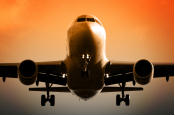The air travel industry is one of the least likely sectors to be leading the charge on tackling climate change. Its fuel consumption is such that it is accountable for 700m tons of CO2 emissions a year and, far from slimming down, the industry's aims are to grow both passenger numbers and airports.
Yet a new initiative, 'Flying Matters', brings together some of the UK's best-known airlines to demonstrate that the sector is taking the issue seriously (Marketing 23 May).
Inevitably, there have already been grumbles that travel groups have been forced to unite in this way to counter criticism from environmentalists.
Air traffic has been expanding at almost two-and-a-half times quicker than average economic growth rates since 1960 and is the world's fastest-growing source of greenhouse gasses, according to environmental alliance GreenSkies, whose supporters include Greenpeace and Friends of the Earth.
Environmental groups have been lobbying the government to introduce targets for aviation to keep CO2 emissions at a safer level, as well as pressuring the aviation industry to respond. When British Airways relaunched its London to Newquay flights earlier this year, Greenpeace responded with a stinging advertising campaign that accused the airline of 'flying in the face of their stated intent to behave in an environmentally responsible manner'.
'Aviation has come under heavy scrutiny in recent years,' says Justin Francis, managing director of online travel agency Responsibletravel.com, which specialises in eco-friendly travel. 'I'm surprised it has taken this long for a collective body to form.'
Led by a consortium of UK travel companies, including Virgin Atlantic, BA and easyJet, as well as UK trade associations including ABTA, 'Flying Matters' has been set up due to 'the lack of a co-ordinated response to attacks the industry is getting', according to the group's director, Michelle di Leo.
However, it appears the initiative will achieve little in practical terms. While campaigns such as 'We're in this together', created by a consortium including B&Q, Barclaycard, British Gas and Marks & Spencer, offer consumers advice and discounts on products intended to help them reduce their CO2 emissions, di Leo admits that her campaign is simply aiming to communicate that air travel is acting responsibly in the face of climate change. 'We want to communicate what the industry is doing in a creative way to cut through the technical terms,' she says.
Travel experts warn the companies may suffer serious PR damage if the group does not produce measurable results. 'We've seen this before with the oil giants when they were challenged,' says a Greenpeace spokesman. 'Exxon was the only member left of the Global Climate Coalition when it disbanded in 2002.'
Green organisations believe the industry should rather pool its resources to best government proposals of a 60% reduction in CO2 emissions by 2050 by a further 20%, and extend the reach of those targets to international aviation.
However, some countries have introduced fuel and emissions taxes for domestic air travel and travel experts believe airlines are concerned these
may be extended to international flights should they be included in targets. 'There are plans to include international aviation but they're not exactly rushing in to it,' says Richard Dyer, aviation campaigner at Friends of the Earth.
Colin Shaddick, travel analyst at Continental Research, believes it is important to acknowledge that some travel companies are investing to lessen the environmental impact of aviation. 'Virgin is investing in fuel-friendly jets and the new Boeing Dreamliner will be 20% more fuel efficient,' he says.
But while airplanes have become progressively greener, new technology is not enough to counter the growth of the industry. Aviation currently contributes 6.3% of CO2 emissions and, with the number of people flying expected to double in the next 15 years, this is expected to rise considerably.
Travel companies' attempts to tap in-to consumer interest in environmental issues could prove good for business. Indulging in a spot of greenwashing could appeal to travellers who care about climate change but are unwilling to rein in their CO2 emissions themselves. But with a vocal green lobby monitoring their every move, the firms involved will be under pressure to show their commitment is more than just words.
Travel facts:
- Commercial jet aircraft generate more than 700m tons of CO2 a year.
- Aircraft greenhouse emissions will be responsible for 15% of global warming by 2050.
- One person flying a return trip between Europe and New York generates between 1.5 and two tons of CO2.
- The Climate Change Bill set targets to cut UK CO2 emissions by 60% by 2050 from 1990 levels. 北京赛车pk10ers want this increased to 80%.
Source: GreenSkies


